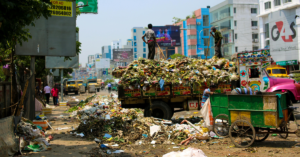Last updated on June 22nd, 2024 at 11:27 pm

In a world where 800 million people go hungry annually, it’s staggering to consider that we waste 1.3 billion tons of food each year. This shocking disparity underscores a profound global challenge: food waste. This issue permeates every level of society, from production and distribution to consumption and disposal, and demands urgent attention.
Understanding the Scale of the Issue
Food waste is not just a problem of excess; it’s a moral and logistical dilemma. Imagine the food discarded annually could feed nearly 2 billion people, more than a quarter of the global population facing hunger. This inefficiency in resource utilization is not just unsustainable but unconscionable in a world where millions suffer from malnutrition and starvation.
The Culprits: From Farm to Table
The journey of food from farm to table involves multiple stages where wastage occurs. In developing nations, inadequate infrastructure leads to significant losses during harvesting, storage, and transportation—approximately 40% of total food loss happens at these stages. In contrast, developed countries see substantial waste at retail and consumer levels, with supermarkets and households discarding perfectly edible food due to overstocking, aesthetic preferences, or simply neglect.
Also Read: The Shocking Truth Behind Rising Fast Food Prices
The Role of Convenience: A Double-Edged Sword
Convenience stores, hailed as urban lifelines for their accessibility and availability, contribute significantly to food waste. In Japan alone, convenience stores discard staggering amounts of food daily, highlighting issues with inventory management and surplus handling. This is replicated globally, where the convenience of quick, ready-to-eat options comes at a steep cost to the environment and global food security.
A Global Challenge Demanding Local Solutions
Addressing food waste requires a multifaceted approach:
- Improved Supply Chain Management: From smarter harvesting techniques in agriculture to enhanced inventory systems in retail, efficiency is key to reducing waste.
- Educating Consumers: Empowering individuals to make informed choices about food consumption can significantly reduce waste at the household level. Buying only what is needed and understanding food expiration dates are simple yet effective steps.
- Policy and Regulation: Governments play a pivotal role in incentivizing reduced waste through legislation and support for food recovery and redistribution programs.
- Technological Innovation: Advances in packaging, preservation, and logistics can extend the shelf life of food and minimize losses across the supply chain.
Initiatives Making a Difference
Around the globe, initiatives are emerging to combat food waste:
- Surplus Redistribution: Organizations are connecting surplus food from restaurants and supermarkets with communities in need, effectively reducing waste while addressing hunger.
- Educational Campaigns: From schools to community centers, awareness campaigns are promoting mindful consumption habits and the importance of reducing food waste.
- Industry Commitments: Major retailers and food chains are pledging to reduce waste through better inventory management and sustainable practices, setting benchmarks for others to follow.
The Way Forward
As consumers, businesses, and policymakers, we must collectively commit to reducing food waste. The potential benefits—less strain on natural resources, reduced greenhouse gas emissions, and more equitable distribution of food—are immense. It’s not just about saving food; it’s about saving lives and safeguarding our planet for future generations.
Also Read: The Hidden Dangers of Energy Drinks and How to Avoid Them
Conclusion
The fight against food waste is not insurmountable. It requires a concerted effort at every level of society, driven by the understanding that our actions today shape the future of food security and environmental sustainability. By embracing innovation, education, and responsibility, we can turn the tide against food waste and build a more resilient and equitable food system for all.
Food waste is not just a statistic; it’s a call to action. Together, we can make a difference—one meal at a time.